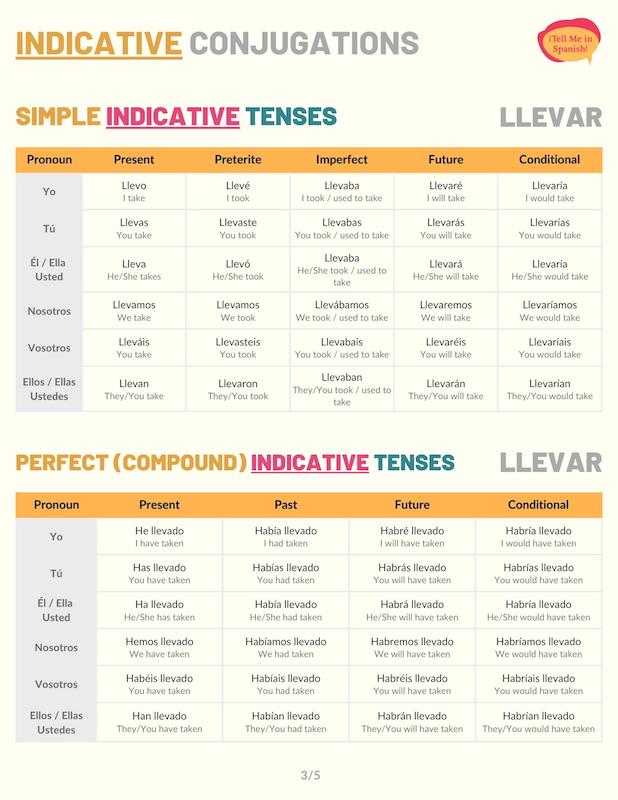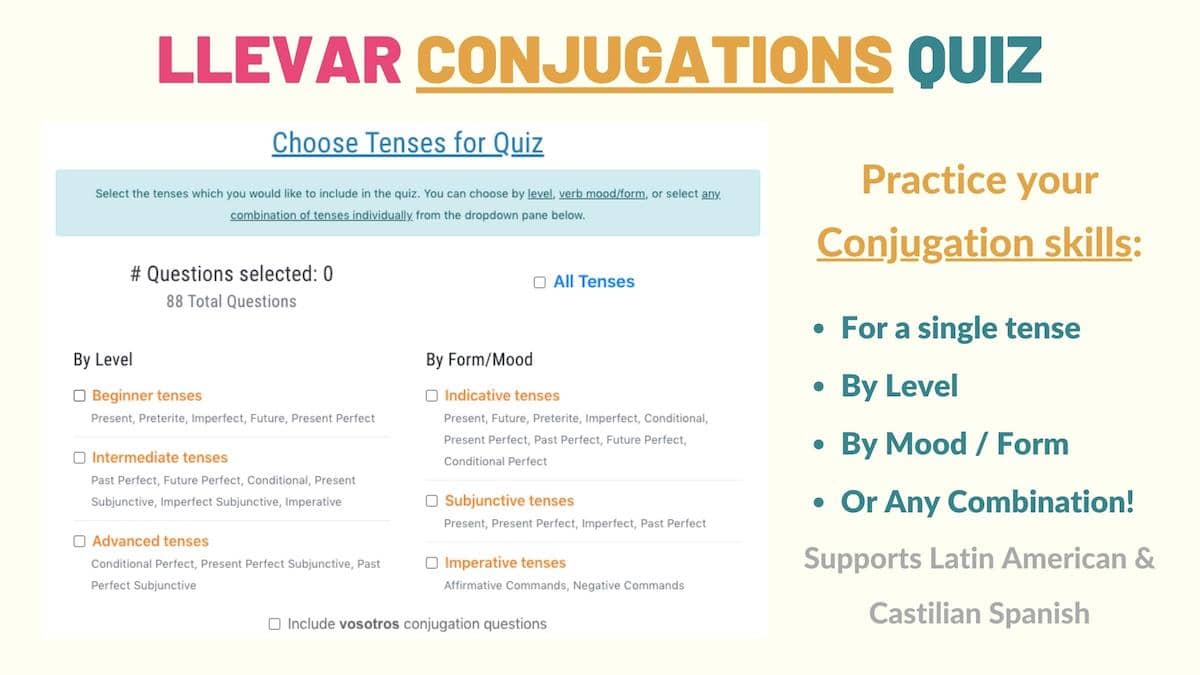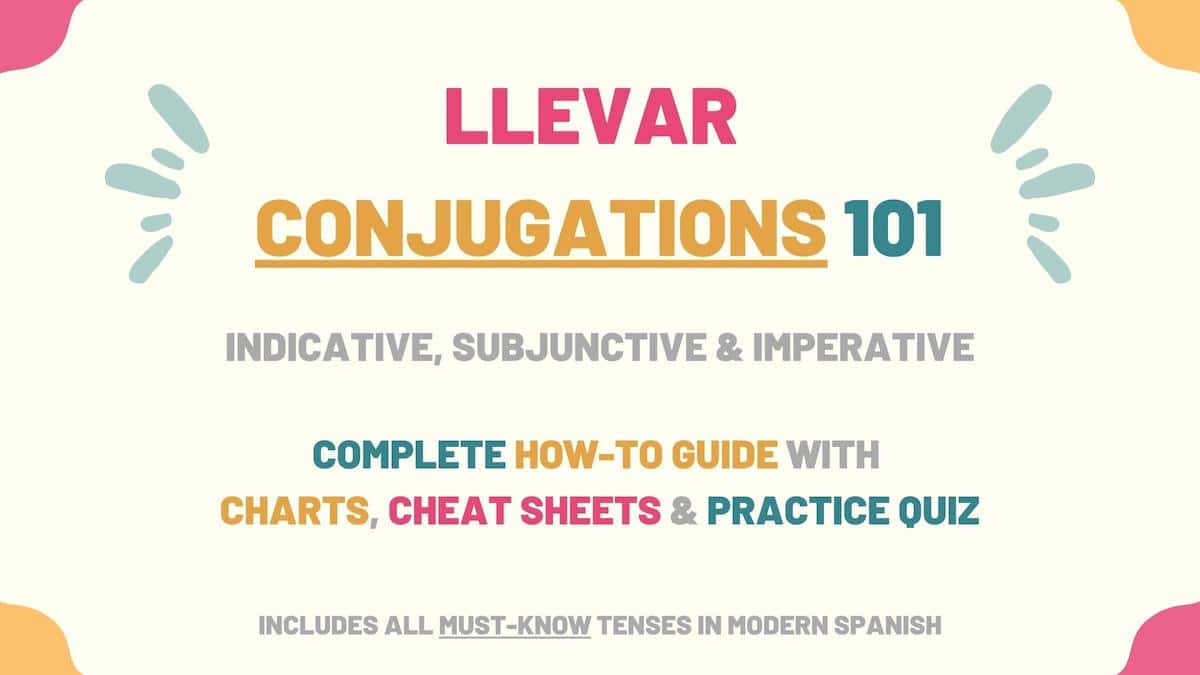Llevar conjugation patterns are a great way to practice regular -AR verbs. Additionally, this verb has multiple daily life applications that can help you improve your fluency. So, in this guide, you’ll learn how to conjugate llevar in Spanish. Here is what we’ll cover:
- Llevar Overview
- Indicative Tenses of Llevar Conjugations
- Subjunctive Tenses of Llevar Conjugations
- Imperative (Commands) of Llevar Conjugations
- Uses & Examples
- Download Llevar Conjugation Tables & Uses Cheat sheets
- Llevar Conjugation Practice Quiz
Overview of Llevar
| Verb Characteristic | Property |
|---|---|
| Verb Type | -AR |
| Irregular | No |
| Infinitive | Llevar |
| Gerund (Present Participle) Form | Llevando |
| Past Participle Form | Llevado |
| Synonyms | Transportar, cargar, guiar. |
In Spanish, llevar means ‘to take’, ‘to carry’, ‘to wear’, among other applications. The conjugations charts below only have one translation to keep the tables as organized as possible. You can learn more about the meanings of ‘llevar’ in the section
Indicative Conjugations of Llevar
Present tense
The present tense conjugations of llevar are regular. Use this conjugation to talk about the people or things you carry or take to a place. For instance: Siempre llevo un cepillo en mi bolsa.
| Person | Conjugation | Translation |
|---|---|---|
| Yo | Llevo | I take |
| Tú | Llevas | You take |
| Él / Ella Usted | Lleva | He/She takes You (formal) take |
| Nosotros | Llevamos | We take |
| Vosotros | Lleváis | You take |
| Ellos / Ellas Ustedes | Llevan | They take You (plural) take |
Preterite tense
The past preterite conjugations of llevar refer to the people or things someone else carried or took at a specific moment in the past. For example: Alicia llevó las cajas a la cochera.
| Person | Conjugation | Translation |
|---|---|---|
| Yo | Llevé | I took |
| Tú | Llevaste | You took |
| Él / Ella Usted | Llevó | He/She took You (formal) took |
| Nosotros | Llevamos | We took |
| Vosotros | Llevasteis | You took |
| Ellos / Ellas Ustedes | Llevaron | They took You (plural) took |
Imperfect tense
When conjugated to the past imperfect tense, llevar is used to talk about people you used to take somewhere repeatedly in the past. For example: Mi papá siempre nos llevaba a la escuela.
| Person | Conjugation | Translation |
|---|---|---|
| Yo | Llevaba | I took I used to take |
| Tú | Llevabas | You took You used to take |
| Él / Ella Usted | Llevaba | He/She took He/She used to take You (formal) took You (formal) used to take |
| Nosotros | Llevábamos | We took We used to take |
| Vosotros | Llevabais | You took You used to take |
| Ellos / Ellas Ustedes | Llevaban | They took They used to take You (plural) took You (plural) used to take |
Near future
The near future of ‘llevar’ communicates that a person is planning to carry something or taking someone to another place. For instance: Voy a llevar estas cajas a tu cuarto. These conjugations of ‘llevar’ are formed withir (present tense) + a + llevar and can be translated as “going to take”.
| Person | Conjugation | Translation |
|---|---|---|
| Yo | Voy a llevar | I’m going to take |
| Tú | Vas a llevar | You’re going to take |
| Él / Ella Usted | Va a llevar | He/She is going to take You (formal) are going to take |
| Nosotros | Vamos a llevar | We’re going to take |
| Vosotros | Vais a llevar | You’re going to take |
| Ellos / Ellas Ustedes | Van a llevar | They’re going to take You (plural) are going to take |
Future simple tense
Llevar future conjugations communicate that someone will carry something or take someone somewhere at some point in the future. For example: Llevaré el paquete a la oficina.
| Person | Conjugation | Translation |
|---|---|---|
| Yo | Llevaré | I will take |
| Tú | Llevarás | You will take |
| Él / Ella Usted | Llevará | He/She will take You (formal) will take |
| Nosotros | Llevaremos | We will take |
| Vosotros | Llevaréis | You (formal) will take |
| Ellos / Ellas Ustedes | Llevarán | They will take You (plural) will take |
Conditional tense
Use the conditional forms of ‘llevar’ to say that a person would take something or someone to a place if some circumstances are met. Si me dejaran, me llevaría a mi perro conmigo.
| Person | Conjugation | Translation |
|---|---|---|
| Yo | Llevaría | I would take |
| Tú | Llevarías | You would take |
| Él / Ella Usted | Llevaría | He/She would take You (formal) would take |
| Nosotros | Llevaríamos | We would take |
| Vosotros | Llevaríais | You would take |
| Ellos / Ellas Ustedes | Llevarían | They would take You (plural) would take |
Present perfect tense
Haber in the present tense + llevado (past participle) is the formula of the Spanish present perfect tense. These conjugations communicate that someone has or hasn’t taken something to another place. For instance: ¿Todavía no te has llevado tus cosas?
| Person | Conjugation | Translation |
|---|---|---|
| Yo | He llevado | I have taken |
| Tú | Has llevado | You have taken |
| Él / Ella Usted | Ha llevado | He/She has taken You (formal) have taken |
| Nosotros | Hemos llevado | We have taken |
| Vosotros | Habéis llevado | You have taken |
| Ellos / Ellas Ustedes | Han llevado | They have taken You (plural) have taken |
Past perfect
Llevar conjugated to the past perfect tense expresses that someone had taken something or someone to a place before some other reference point in the past. Dijiste que habías llevado a tu hermano al parque. To form the past perfect, use the imperfect form of ‘haber’ and the past participle form of ‘llevar’.
| Person | Conjugation | Translation |
|---|---|---|
| Yo | Había llevado | I had taken |
| Tú | Habías llevado | You had taken |
| Él / Ella Usted | Había llevado | He/She had taken You (formal) had taken |
| Nosotros | Habíamos llevado | We had taken |
| Vosotros | Habíais llevado | You had taken |
| Ellos / Ellas Ustedes | Habían llevado | They had taken You (plural) had taken |
Future perfect
Llevar conjugated to the future perfect tense expresses that someone will have taken or carried something by or before a certain time in the future. These conjugations are also used to express that someone might have taken something. For instance: Mañana me habré llevado mis cosas.
| Person | Conjugation | Translation |
|---|---|---|
| Yo | Habré llevado | I will have taken |
| Tú | Habrás llevado | You will have taken |
| Él / Ella Usted | Habrá llevado | He/She will have taken You (formal) will have taken |
| Nosotros | Habremos llevado | We will have taken |
| Vosotros | Habréis llevado | You will have taken |
| Ellos / Ellas Ustedes | Habrán llevado | They will have taken You (plural) will have taken |
Conditional perfect
The conditional perfect conjugations of llevar are used to convey that someone would have taken another person to a place or carried something if a past condition had been met. For instance: Si hubiera tenido dinero, te habría llevado al concierto.
| Person | Conjugation | Translation |
|---|---|---|
| Yo | Habría llevado | I would have taken |
| Tú | Habrías llevado | You would have taken |
| Él / Ella Usted | Habría llevado | He/She would have taken You (formal) would have taken |
| Nosotros | Habríamos llevado | We would have taken |
| Vosotros | Habríais llevado | You would have taken |
| Ellos / Ellas Ustedes | Habrían llevado | They would have taken You (plural) would have taken |
Progressive tenses
Use the progressive tenses of llevar to say that someone is taking a person or thing to another place at the moment of speaking. Or, in the case of past forms (preterite and imperfect), to communicate that a past action was in progress when you carried something. For example: Paco está llevando las cajas a la cochera.
Spanish progressive tenses are conjugated by using the formula estar + present participle of llevar.
| Progressive Tense | Formula | Translation Example |
|---|---|---|
| Present | Estar (present) + llevando | I am taking |
| Preterite | Estar (preterite) + llevando | You were taking |
| Imperfect | Estar (imperfect) + llevando | He was taking |
| Future | Estar (future) + llevando | We will be taking |
| Conditional | Estar (conditional) + llevando | They would be taking |
Llevar Subjunctive Conjugations
In Spanish, the subjunctive is used to talk about wishes, hypothetical situations or express uncertainty. The conjugation charts below show the subjunctive forms of llevar.
Present subjunctive
Llevar subjunctive conjugations refer to a person’s current wishes or requests about taking something or someone to a place. For instance: Ellos quieren que lleve el carro al mecánico.
| Person | Conjugation | Translation |
|---|---|---|
| Yo | Lleve | I take |
| Tú | Lleves | You take |
| Él / Ella Usted | Lleve | He/She takes You (formal) take |
| Nosotros | Llevemos | We take |
| Vosotros | Llevéis | You take |
| Ellos / Ellas Ustedes | Lleven | They take You (plural) take |
Present perfect subjunctive
Haber in the present subjunctive + llevado is the formula to build the present perfect subjunctive of ‘llevar’. When using this tense, ‘llevar’ allows you to wonder or wish that someone has already carried or taken something to another place. Espero que ya te hayas llevado tus cosas.
| Person | Conjugation | Translation |
|---|---|---|
| Yo | Haya llevado | I have taken |
| Tú | Hayas llevado | You have taken |
| Él / Ella Usted | Haya llevado | He/She has taken You (formal) have taken |
| Nosotros | Hayamos llevado | We have taken |
| Vosotros | Hayáis llevado | You have taken |
| Ellos / Ellas Ustedes | Hayan llevado | They have taken You (plural) have taken |
Imperfect subjunctive
Use the imperfect subjunctive conjugations of ‘llevar’ to talk about past requests, suggestions, wishes you or someone else had about taking or carrying something to another place. Martha me pidió que llevara sus cosas al coche.
The imperfect subjunctive has two conjugation models depending on which type of Spanish you’re using:
Latin American Spanish version
| Person | Conjugation | Translation |
|---|---|---|
| Yo | Llevara | I took |
| Tú | Llevaras | You took |
| Él / Ella Usted | Llevara | He/She took You (formal) took |
| Nosotros | Lleváramos | We took |
| Ellos / Ellas Ustedes | Llevaran | They took You (plural) took |
Note: The table above doesn’t include the conjugation for vosotros because this pronoun is not used in Latin American Spanish.
Castilian Spanish version
| Person | Conjugation | Translation |
|---|---|---|
| Yo | Llevase | I took |
| Tú | Llevases | You took |
| Él / Ella Usted | Llevase | He/She took You (formal) took |
| Nosotros | Llevásemos | We took |
| Vosotros | Llevaseis | You took |
| Ellos / Ellas Ustedes | Llevasen | They took You (plural) took |
Past perfect subjunctive
In the past perfect subjunctive, llevar conveys that someone or something would have taken or carried something to somewhere if a past circumstance was met. You can also use these conjugations to express regrets or hypothetical outcomes if you had taken or carried something.
For example: Si me hubieras llevado, habría llegado temprano.
| Person | Conjugation | Translation |
|---|---|---|
| Yo | Hubiera llevado | I had taken |
| Tú | Hubieras llevado | You had taken |
| Él / Ella Usted | Hubiera llevado | He/She had taken You (formal) had taken |
| Nosotros | Hubiéramos llevado | We had taken |
| Vosotros | Hubierais llevado | You had taken |
| Ellos / Ellas Ustedes | Hubieran llevado | They had taken You (plural) had taken |
Llevar Imperative Conjugations
The Spanish imperative mood has the conjugations you use to give commands.
Affirmative commands
The affirmative imperative of ‘llegar’ is used to order people to take someone or something to another place. For example: Lleven su ropa sucia a la lavadora.
| Person | Conjugation | Translation |
|---|---|---|
| Tú | Lleva | Take |
| Usted | Lleve | Take |
| Vosotros | Llevad | Take |
| Ustedes | Lleven | Take |
Negative commands
To command people to not take or carry something to another location, use negative commands. For instance: No te lleves el carro hoy.
| Person | Conjugation | Translation |
|---|---|---|
| Tú | No lleves | Don’t take |
| Usted | No lleve | Don’t take |
| Vosotros | No llevéis | Don’t take |
| Ustedes | No lleven | Don’t take |
Meanings of Llevar & Examples
Now that you’ve learned how to conjugate llevar in Spanish, you should check the following examples to get familiar with the most common uses of this verb.
1. Talk about taking someone or something to another place
[Llevar conjugated] + [noun] + a + [place]
Lleven estas bolsas a la cocina.
Take these bags to the kitchen.
[Llevar conjugated] + a + [person] + [place]
Julie quiere que lleves a las niñas a la escuela.
Julie wants you to take the girls to school.
Take Note: When the context is clear, you can use Spanish direct object pronouns to replace the thing or person you’re talking about.
2. Talk about the duration of an action
[Llevar conjugated] + [present participle]
¿Cuánto llevas esperando?
How long have you been waiting?
Take Note: People often think that Spanish present participles can only be used to form the present progressive. However, these participles can be combined with other verbs to deliver different meanings.
3. Express age gaps and amounts
[Indirect object pronoun] + [llevar conjugated] + (number) + [infinitive]
Nos llevó dos horas terminar este proyecto.
It took us two hours to finish this project.
When referring to amounts, llevar can also be used to express the age gap between a person:
[Indirect object pronoun] + [llevar conjugated] + (number)
Mi hermano me lleva un año.
My brother is one year older than me.
4. Ask and talk about the ingredients in a dish
[Llevar conjugated] + [noun]
¿Qué lleva la ensalada?
What’s in the salad?
5. Express consequences
[Llevar conjugated] + a + (consequence)
Esto nos llevó a tomar otras medidas.
This led us to take other measures.
6. Describe clothing and accessories someone is wearing
[Llevar conjugated] + [article] + [noun]
Creo que Sandra llevaba una camisa roja.
I think Sandra was wearing a red shirt.
7. Talk about how well or bad people get along with others
[Reflexive pronoun] + [llevar conjugated] + (bien/mal)
Sally y yo nos llevamos mal.
Sally and I don’t get along well.
Take Note: In this context, adverbs of manner can help you describe how well or how badly you get along with others.
Download Llevar Conjugation Tables & Uses Cheat sheets

Llevar is a highly dynamic verb with many different meanings and uses in Spanish. I’ve created a PDF you can download with all the llevar conjugation tables as well as meanings and uses.
Practice Quiz: Llevar Conjugation

Now that you’ve learned how to conjugate llevar in Spanish, you can put your knowledge to the test by taking this llevar conjugation practice quiz, full for all its tenses.



